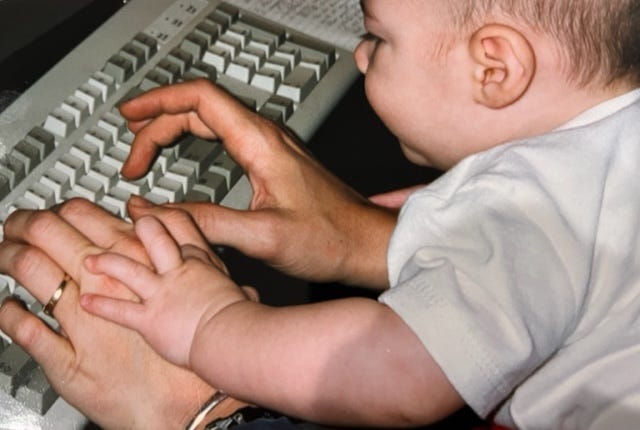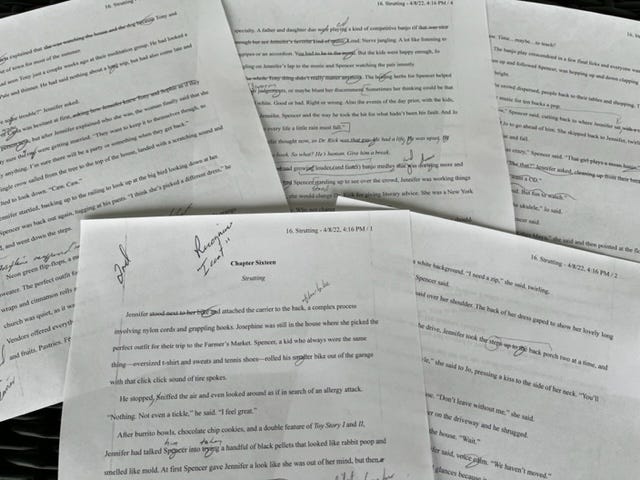Improve Your Writing: Creative Writing Courses for Beginners
After that first time up to read, I developed a system of going through the commentary from Tom and the other writers page by page and transferring all their marks onto a my master set of pages. Praise. Typographical errors. Line edits. Everything.
Next, I sat down and typed the feedback into my computer copy.
If a suggestion bugged me, I didn’t cast it aside. Rather, I looked at this feedback a couple extra times to see what bugged me. If I still couldn’t make it work, I let the comment go.
The entire process took about two hours.
Even if it meant I had a baby on my lap, I put in those edits STAT. Master Spencer was more than eager to help.
Let me say it again: I entered edits. I did not re-write. If I re-wrote then I’d lose the benefit of the edits. I have a belief there is a powerful and immediate energy in feedback from your teacher, editor, and classmates. It is alive. And it has an expiration date like milk. ???? For me, it was about seventy two hours. Maybe a week.
I got my feedback in within three days. Always.
I know a lot of writers who do not incorporate feedback into their work right away. What they do instead is save their workshop pages in a file while believing they will go back later, or in the next draft. When they do go back, what happens is they have forgotten what was said in the particular workshop. What had been brilliant, on-point, and timely feed back is now curdled. And all that lovely, smart workshop wisdom has become useless.
I might be making more of this than I should, but it happens in my own classes at Blackbird Studio, too. People say, “Oh, no, I’m not putting the comments into my work, not yet,” and this helps me understand why they are not making progress in their craft. That is another thing about incorporating the feedback right away. By putting even the smallest change into the work, you are growing in your craft.
The only kind of writing rewriting.
~ Earnest Hemmingway, A Moveable Feast
Why does a writer resist this part of the workshop process?
????????♀️ I’m not sure.
Could be fear.
A sense that the purity of their vision might be tainted.
Or it might be that they aren’t ready for feedback emotionally. Maybe they are waiting until they feel safe.
Or…as a memoir writer…it could be that the content is so painful that the feedback doubles down on that pain.
So, okay. If that’s the case, you’ve got to do what you’ve got to do. Live and learn and all that. Maybe take it one page at a time at first, then see if you can add two pages after a couple workshopping sessions.
Another reason a writer might not incorporate feedback has to do with the shock of getting pages back with so many edit suggestions. This is a very real feeling. That part is startling, especially at first. But remember, writing is re-writing, and re-writing, and re-writing. The only way to get better is to tear it apart and start again.
Like you need layers and layers of paint on a canvas before you can achieve any real depth in your images. Like knitting, you have to drop a lot of stitches and pull a lot of work apart. Writing asks the same of you. But the sooner you make friends with edits and revision, the faster you’ll improve.
“Gak!” you might be thinking, “And she’s a NYT bestseller?” Yep. That’s called revision.
To give you some sense of how aggressively I edit myself, here are pages from just this week. I’d say that about seventy to eighty percent of what I write first pass must be moved around, or trashed. With each pass over the work, maybe twenty or so passes, that number shifts to sixty, then fifty, then maybe forty percent. What I’m saying here is that it is a process, and a tedious one, but nothing is going to happen without a certain aggressiveness when it comes to editing your work.
Your workshop group is trying to help you.
Let them.
Your Turn:
If you are a seasoned writer, share your process with feedback. What works? What doesn’t?
You can try a free-write on this too. If you are someone who is resistant to editing, ask yourself why. Sit down with a pad of paper and just let it rip. This could could go into your emotional journal from the Stages and Phases Post. Ask what’s going on. What are you afraid of? Do you have some unrealistic expectations? A past with a perfectionist parent or teacher on your back? See what comes up.





